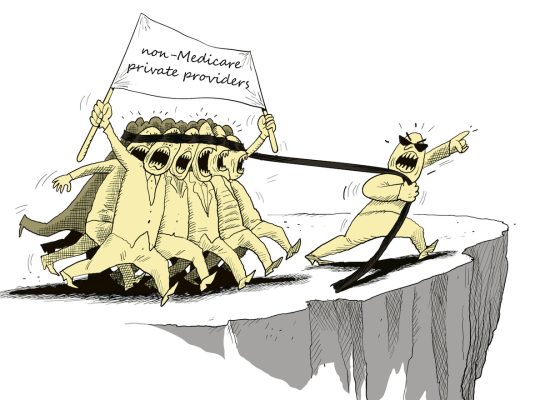The Department has also flagged it is aiming for a national medical appointment booking system.
Sharing by default rules for pathology and diagnostic imaging will be in place by the end of 2025 and then the Department of Health, Disability and Ageing will turn its attention to getting primary care practitioners – including online telehealth companies – to upload patient data by mandate.
Daniel McCabe, first assistant secretary and boss of the DoHDA Medicare and Digital Health division, told an audience of software vendors at the Medical Software Industry Association’s summit in Brisbane today, that the second-term Labor government was ready to “lean in” to uplifting the health system.
“We’ll have the rules in place by the end of this calendar year for [sharing by default for] pathology and diagnostic imaging. We are now setting our minds to work on what’s next,” said Mr McCabe.
Primary care will be the focus over the next period, he confirmed.
“We’re going to start to look at sharing by default for all primary care information collection,” he said.
“We’re going to mandate, through our urgent care clinics, that all that those clinics upload event summaries for every patient they are treating.
“Healthdirect is already implementing and sharing by default for their virtual GP services.
“I’ve been talking to the minister [for health Mark Butler] about requiring online telehealth companies to also start sharing their [data] to My Health Record, and we will work through that through consultation about what we might do to support the industry to do that.”
In another revelation, Mr McCabe said the DoHDA wanted to capitalise on a booking system that was already “really good” by making it a national asset.
“We want to make sure, similar to what the UK is doing, that Australians can book and cancel appointments in one place,” he said.
“We recognise there’s a really good booking engine ecosystem here in Australia, but we need all of those vendors to participate with us and join their hooking services up with our national health services directory and our MyHealth app, where we can promote the flexibility that we want to create to make sure Australians are getting access to appropriate primary care, appropriate secondary care and appropriate tertiary care.”
Also on the agenda will be the finalisation of standards for chronic condition management, Mr McCabe told the audience.
Related
“I want to start to then talk about how we build, through our Spark FHIR accelerator, a standard for encounter records for every consultation that happens in the Australian health system, so we can capture meaningful data at the point of care and then require that to be shared by default as well,” he said.
“I haven’t put a timeline on that for everything, because I think there’s a lot of work we need to do with clinicians.”
There are over 300 million consultations in Medicare a year, he said, confirming that he has been talking with the colleges and the AMA about the enormous task.
“We need to do a lot of work in change management, but we are serious about really pulling through all the good work that everyone’s doing in the standards agenda and actually turning it into meaningful insights for consumers,” said Mr McCabe.
The Albanese was committed, in its second term, to driving productivity across the whole economy and in the context of the DoHDA’s agenda for digital uplift, Mr McCabe outlined five over-arching themes, including:
- Using technology to reduce duplication and waste;
- Improving access to healthcare;
- Early intervention to keep Australians healthy;
- Real-time insights at the point of care;
- Feedback loop (population health and planning).
“We have an ageing population which is living longer, which is good, but it’s needing much more health care and much more prevention,” said Mr McCabe.
“We have one in two Australians now living with one or more chronic health conditions, and we have much more complex health needs than we did 20 or 30 years ago, and the workforce is under pressure.
“We need to think about, how do we use all of the tools to support our workforce, making sure that we’re having a look at the scope of practice for all health professionals, to make sure that everyone’s working at their top of scope, and this can only occur If we give them good information, good tools and support everyone to work effectively.”
AI would become an important focus for the department, said Mr McCabe.
“The government, coming back into the second term, wants to lean into digital and AI a lot more across all parts of the economy,” he said.
“We are working with government at the moment to think about what could we do to really encourage safe and appropriate use of AI in healthcare.
“We think about it from two different dimensions.
“One is, what can we do for Australians to make sure that they can best understand and navigate our complex health system using AI to understand where they might get the help they need, how they might be able to assess symptoms and then get referred to appropriate pathways, or how they might be able to do self-care.
“We think AI will have a role in that space.”
Mr McCabe said there was an “equally a huge opportunity to reduce the administrative burden for health professionals”.
“We will be working over the coming months about what that might look like and how we might do that, including, does government have a role in assessing these tools, giving advice to physicians about what we think are good and Star Ratings potentially around some of these tools, the efficacy of them, plus the consent and privacy arrangements,” he said.




